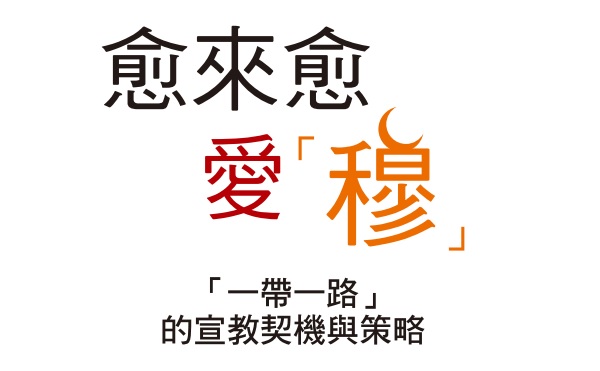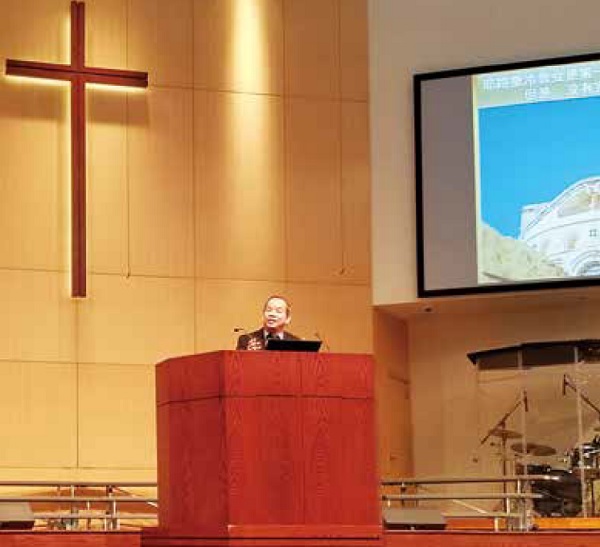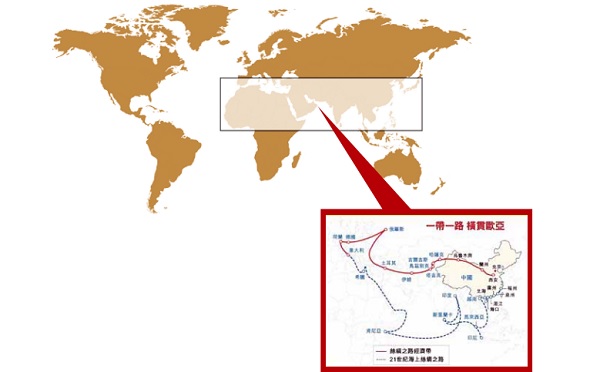Love Mu more and more
[Cross-Cultural Mission] Missionary Opportunities and Strategies of “One Belt, One Road”

Since he believed in Christ at the age of 18, he has visited more than 70 countries and preached the gospel to more than 100 ethnic groups in the past 38 years. Among them, he especially loves "Mu". "Mu Xuan" is his mission and his practical action in response to God's call of love and obedience.
"If we only ask others to preach to Muslims and love Muslims, but we stand far away, fearfully, and have nothing to do with ourselves, is this God's will? Growing up in a country where Muslims are the majority , If I don’t have any burden for Muslims, who will?” Wang Meizhong (hereinafter referred to as President Wang), the president of the Malaysian Baptist Theological Seminary, said impassionedly.
In the golden autumn of 2017, during the missionary month of Ruoge Church in New Jersey, President Wang used Abraham's example of faith to encourage the congregation to let go of themselves, obey God's will, and bravely leave their hometown, because life is a mission, and missionary experience is a sign of faith. experience. He challenged the church and made a call to the congregation - "Yes, cross-cultural missionary work is not an easy road, it is a high and low road; but what is certain is that it must be a glorious road."
In the mission discussion, President Wang used the themes of "Mission Opportunities and Challenges of the Belt and Road Initiative" and "How Chinese Churches Should Care About Mission in the Middle East", reminding us that "all roads lead to Rome" two thousand years ago, because of the opening up of communication. Spread the gospel. Today, in the face of the opportunities provided by the "One Belt, One Road" strategy, Chinese churches must also seize the opportunity of increased communication. From the perspective of the mission of global evangelization, overseas Chinese Christians are bound to not be absent.

▲President Wang Meizhong of the Malaysian Baptist Theological Seminary called: "The mission of the Chinese church should not just be a narrow concern for the Chinese world." (Photo courtesy: Yao Xiuling)
The missionary opportunities of “One Belt, One Road”
"One Belt, One Road" is a major foreign economic policy proposed by China in 2013. It is the abbreviation of "Silk Road Economic Belt" and "21st Century Maritime Silk Road" (English abbreviation: The Belt and Road). "One Belt, One Road" is a concept and initiative for cooperative development. It relies on existing bilateral and multilateral mechanisms between China and relevant countries and relies on existing and effective regional cooperation platforms. It aims to borrow the historical symbols of the ancient "Silk Road" , hold high the banner of peaceful development, actively develop economic partnerships with countries along the route, and jointly build a community of interests, destiny and responsibility featuring political mutual trust, economic integration, and cultural tolerance.
What do the Belt and Road Initiative and missions have in common? President Wang said that it passed through a total of 65 countries, including places where Muslims, Hindus and Buddhists mainly live. In particular, there are 29 Muslim countries, accounting for almost half of the 63 Muslim countries in the world. Dean Wang pointed out that the “Belt and Road Initiative” is a sign of opportunity for missionary work because the countries it passes through account for 67% of the world’s population (4.7 billion) and 29% of global GDP (21 trillion U.S. dollars). Most of the areas covered by the “Belt and Road Initiative” have large populations but relatively backward economies. If the Chinese church can seize the opportunity, discern the opportunity, and follow the trend, it will be able to push cross-cultural missionary work to a new milestone.
Some experts and scholars have given some reminders and suggestions. There are many countries and ethnic groups along the “One Belt and One Road”, complex political, religious and cultural situations, and many uncertainties. The Chinese church is in its infancy in terms of missionary work. Missionary enthusiasm should not become impetuous and blind as a movement. Instead, it needs to establish a series of mechanisms for mobilization, recruitment, training, sending, and care. There are many lessons to learn. There are many Christians in the churches in mainland China, but they lack systematic training. If they are sent out blindly, the consequences will be serious. Missionaries should be people with affection, reason, and the fruits of the Holy Spirit. They need to be well screened and cultivated; and missions are universal. Chinese churches and Chinese churches should cooperate closely with Western and other churches, and work side by side to complete the great mission. mission.
The missionary strategy of “One Belt, One Road”
Dean Wang can be said to be one of the earliest pastors in Chinese missionary institutions to care about and follow up on the “One Belt, One Road” initiative. Perhaps because he has lived in Malaysia for many years and has been in contact with the Muslim ethnic group for a long time, when the "One Belt, One Road" policy was proposed, he quickly became acutely aware that it would be a sign and opportunity for evangelism to Muslims. Subsequently, he held many seminars on "One Belt, One Road and Missionary Opportunities" around the world, inviting more than 200 people including deans of seminaries, heads of missionary agencies, missionary experts, pastors, and missionaries from all over the world to have in-depth discussions. Explore. Regarding missionary strategies, the following eight key points are summarized.
1. Website building and missionary work: While the Maritime Silk Road connects ninety-seven seaport cities, the Overland Silk Road connects twenty-eight countries. Combined with the layout and progress of the "One Belt, One Road" initiative, churches and missionary agencies can establish "missionary extension stations" at strategic locations as a base for training, extension, and support.
2. Church planting and missionary work: First seek vision and burden, and consider planting churches in Belt and Road countries, or cooperating with local organizations for missions, rather than fighting alone. Be good at helping local people and supporting local people.
3. Holistic mission: Carry out caring mission to local poor or particularly needy groups. The gospel is not just words, but also care in action.
4. Dual-vocational missionary: enter the place with the original profession and the missionary mission. Muslim countries do not welcome missionaries, but they do not object to foreign teachers, businessmen, and engineers. Not only that, banking, finance, translation, law, medical care, services, education, beauty, catering, etc., with the economic development, there is a large demand for talents from all walks of life.
5. High-speed rail missionary service: “All roads lead to Rome” is Paul’s missionary route. Today, "all high-speed railways lead to China", including the Central Asia High-speed Railway, the Eurasian High-speed Railway, and the Pan-Asia High-speed Railway, totaling 59,000 kilometers, running through 28 countries. The cities along the high-speed rail can be the gateway for missionary work, and they can be "connected" and "preached" on the high-speed rail road.
6. Business missionary: "One Belt, One Road" is an economic belt, a business road, and a major economic alliance. Encourage Christians to invest and set up factories in these places to support the development of missionaries and local churches. Organize a Great Commission company and send people to these places for business missionary work to learn and promote the "Wenzhou three-in-one model": immigration + business promotion + church planting.
7. Immigration missions: Immigrate collectively for the sake of the kingdom of heaven, establish a Christian community, and exert a collective influence, which can not only deepen the church, but also serve as a testimony of light and salt in the long run, strengthening the new church established.
8. The mission of a grain of wheat: to put yourself to death before living, to die to yourself first, to be truly willing to pay the price, and to have the mental preparation of "living is for Christ, and dying is beneficial."
"Made in China" missionaries
The areas shown in the "10/40 Window" (see illustration on the next page) almost completely overlap with the areas covered by China's Belt and Road Initiative. This should not be just a historical accident!
Dean Wang once again mentioned that the Belt and Road Initiative has directly affected more than 60 countries, of which 13 are mainly Orthodox, 10 are Buddhist countries, 29 are Muslim countries (accounting for half of the world’s Muslim population), and 10 are Catholic. Countries, two Hindu countries, two predominantly Protestant countries and one Jewish country.
Muslim Europe is a "Muslim" field where evangelism is easier to spread than in the Middle East, and Christianity in Europe is in decline. Dean Wang encouraged Chinese churches in Europe to seize opportunities to evangelize local Muslims. He also challenged the Chinese churches not to have a narrow-minded mentality of only preaching the gospel to Chinese people of the same language and ethnicity, nor to have a hometown mentality of only preaching the gospel to people in their hometown.
During the seminar, Dean Wang mentioned an unforgettable story. Many years ago, he went to Egypt for missionary work. A local asked him: "We use a lot of 'Made in China' items here, but why do we rarely see 'Made in China' missionaries?" This sentence deeply touched his heart. This thorn in Dean Wang’s heart strengthened his determination to do cross-cultural missionary work.
"If the Chinese church wants to follow China's economic development and complete the 200-year-old path of the West in only thirty years, this will not work in missionary work. If we want to cooperate with Western missions, we must not be blind and impatient."
"We need more "Made in China" missionaries. For "Mu Xuan", we advance despite difficulties and never retreat; although it is difficult, hard, and dangerous, we must remember that this is the mission!" Dean Wang finally said with sincerity: Many elite Western missionaries in the past hundred years have dedicated themselves to the Chinese. If today’s Chinese Christians only care about the Chinese world, it is not only narrow-minded, but also a serious debt to the Kingdom of God by the Chinese church.
Times may change, but the missionary mission remains the same. Facing the opportunities of the One Belt and One Road strategy, I hope that the Chinese church will seize the opportunity, re-view the mission of cross-cultural missions, and love "Mu" more and more.

▲"One Belt, One Road".
‧Passed through twenty-nine Muslim countries.
‧North latitude 10-40 degrees from West Africa to Asia.
‧Has two-thirds of the world’s population.
‧Among the fifty-five countries with "underreached groups", 97% is located here.
‧There are more than 760 million Muslims, more than 720 million Hindus and more than 150 million Buddhists.
(Source: ccminternational.org)
 Liao Meihui, from Taiwan, settled in New Jersey, a recent graduate of the Chinese Evangelical Theological Seminary in North America, is a special writer for this magazine.
Liao Meihui, from Taiwan, settled in New Jersey, a recent graduate of the Chinese Evangelical Theological Seminary in North America, is a special writer for this magazine.
